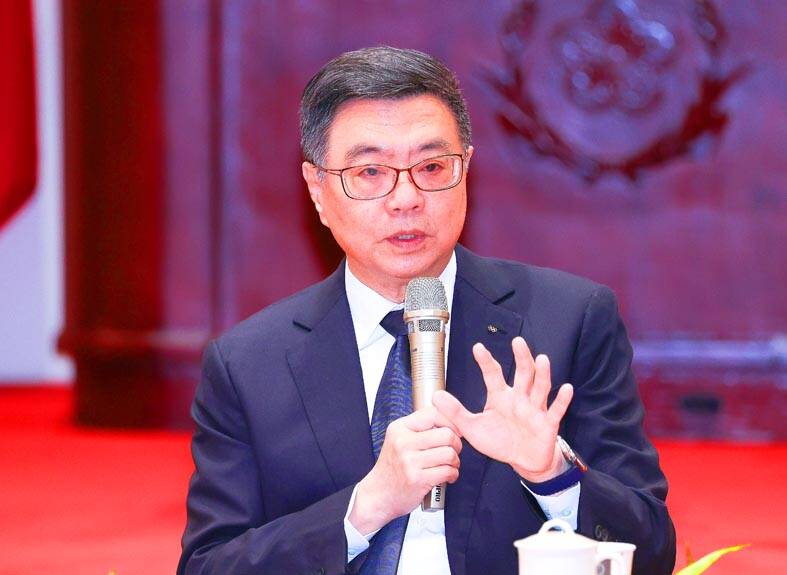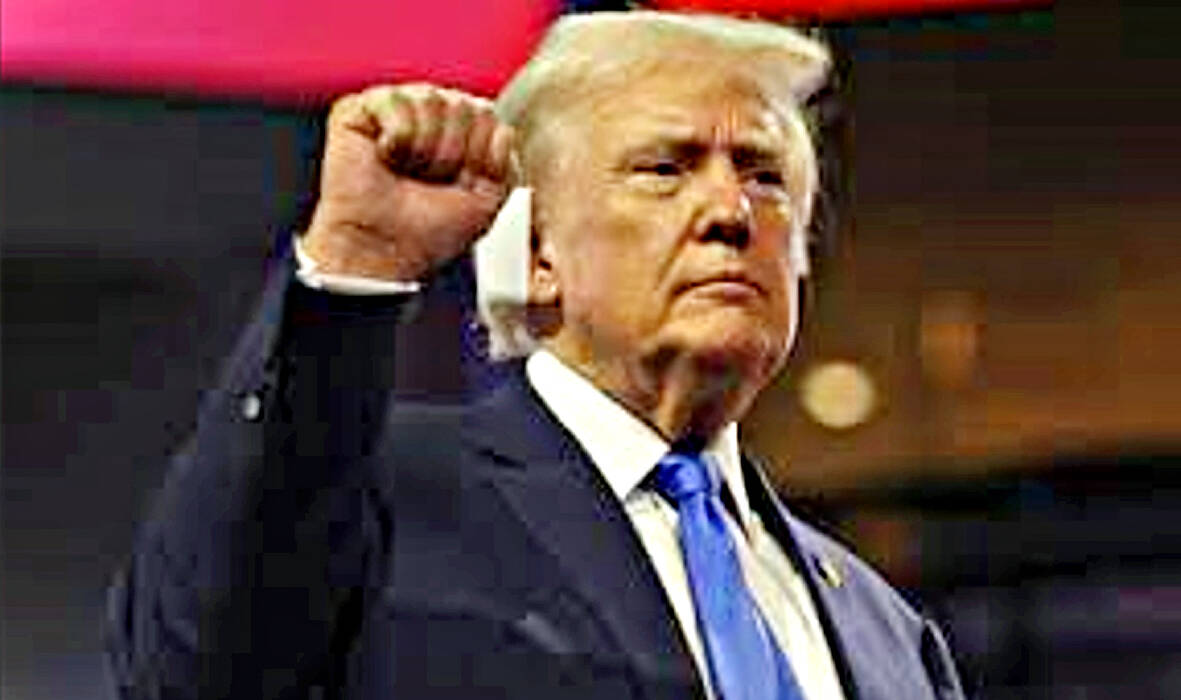Taiwan-US relations are solid, and both sides are in agreement that peace and stability in the Taiwan Strait and the Indo-Pacific region are everyone’s concern, Premier Cho Jung-tai (卓榮泰) said yesterday following comments by former US president Donald Trump that Taiwan “should pay” for US defense.
Taiwan is thankful to the US for supporting Taiwan’s bid to participate in international organizations, Cho told a news conference in Taipei.
“I know the people very well, respect them greatly. They did take about 100 percent of our chip business,” Trump told Bloomberg on June 25 in an interview that was published on Tuesday.

Photo: CNA
“I think Taiwan should pay us for defense,” Trump added. “You know, we’re no different than an insurance company. Taiwan doesn’t give us anything.”
In the long run, the continuation of policies demonstrating that Taiwan is shouldering the responsibility of being a part of the international community would win it the support of more nations, Cho said.
Taiwan occupies a critical position in the high-tech supply chain, and while manufacturing is spread around the world, research and development would remain in Taiwan, Cho said when asked about the government’s response if Trump were to return to the White House and demand that Taipei relocate research and development to the US.

Photo: EPA
The TAIEX closed nearly 1 percent lower yesterday. Taiwan Semiconductor Manufacturing Co (台積電), the most heavily weighted firm on the index, declined 2.4 percent ahead of its scheduled second-quarter earnings release today after adding more than 9 percent this month through Tuesday.
The Ministry of Foreign Affairs declined to comment on the remarks of the presumptive Republican candidate for the US presidential election on Nov. 5.
The next administration enters the White House in January next year.
Trump is to accept his party’s nomination at the Republican National Convention today.
Democratic Progressive Party caucus secretary-general Rosalia Wu (吳思瑤) said she could not comment on Trump’s interview.
US-Taiwan relations are built on solid foundations of equal and mutually beneficial development in military, economic and cultural interactions, Wu said.
The public should take note of Trump’s running mate, J.D. Vance, who has repeatedly stated that the US would do its best to bolster interactions with Taiwan across all sectors instead of focusing on Trump’s one comment, she added.
Pegatron chairman Tung Tzu-hsien (童子賢) said that Taiwan should refrain from commenting on US elections and should respect the democratic systems of other nations.
Instead of focusing on campaign talk in the US, Taiwan should instead make sure that whoever is elected would continue to understand the importance of Taiwan and its role as a benign and contributing member of the international community, Tung said.
Taiwan People’s Party Legislator Huang Kuo-chang (黃國昌) said that Trump’s comments were understandable, as he is still on the campaign trail and is focused on delivering the message that he is all about US interests.
President William Lai’s (賴清德) administration must clarify how it intends to handle Taiwan-US ties after the US elections, Huang said.
Trump’s comments clearly indicate that relations between countries cannot continue if one side is perpetually giving, he added.

CHAOS: Iranians took to the streets playing celebratory music after reports of Khamenei’s death on Saturday, while mourners also gathered in Tehran yesterday Iranian Supreme Leader Ayatollah Ali Khamenei was killed in a major attack on Iran launched by Israel and the US, throwing the future of the Islamic republic into doubt and raising the risk of regional instability. Iranian state television and the state-run IRNA news agency announced the 86-year-old’s death early yesterday. US President Donald Trump said it gave Iranians their “greatest chance” to “take back” their country. The announcements came after a joint US and Israeli aerial bombardment that targeted Iranian military and governmental sites. Trump said the “heavy and pinpoint bombing” would continue through the week or as long

TRUST: The KMT said it respected the US’ timing and considerations, and hoped it would continue to honor its commitments to helping Taiwan bolster its defenses and deterrence US President Donald Trump is delaying a multibillion-dollar arms sale to Taiwan to ensure his visit to Beijing is successful, a New York Times report said. The weapons sales package has stalled in the US Department of State, the report said, citing US officials it did not identify. The White House has told agencies not to push forward ahead of Trump’s meeting with Chinese President Xi Jinping (習近平), it said. The two last month held a phone call to discuss trade and geopolitical flashpoints ahead of the summit. Xi raised the Taiwan issue and urged the US to handle arms sales to

BIG SPENDERS: Foreign investors bought the most Taiwan equities since 2005, signaling confidence that an AI boom would continue to benefit chipmakers Taiwan Semiconductor Manufacturing Co’s (TSMC, 台積電) market capitalization swelled to US$2 trillion for the first time following a 4.25 percent rally in its American depositary receipts (ADR) overnight, putting the world’s biggest contract chipmaker sixth on the list of the world’s biggest companies by market capitalization, just behind Amazon.com Inc. The site CompaniesMarketcap.com ranked TSMC ahead of Saudi Aramco and Meta Platforms Inc. The Taiwanese company’s ADRs on Tuesday surged to US$385.75 on the New York Stock Exchange, as strong demand for artificial intelligence (AI) applications led to chip supply constraints and boost revenue growth to record-breaking levels. Each TSMC ADR represents

Pro-democracy media tycoon Jimmy Lai’s (黎智英) fraud conviction and prison sentence were yesterday overturned by a Hong Kong court, in a surprise legal decision that comes soon after Lai was jailed for 20 years on a separate national security charge. Judges Jeremy Poon (潘兆初), Anthea Pang (彭寶琴) and Derek Pang (彭偉昌) said in the judgement that they allowed the appeal from Lai, and another defendant in the case, to proceed, as a lower court judge had “erred.” “The Court of Appeal gave them leave to appeal against their conviction, allowed their appeals, quashed the convictions and set aside the sentences,” the judges